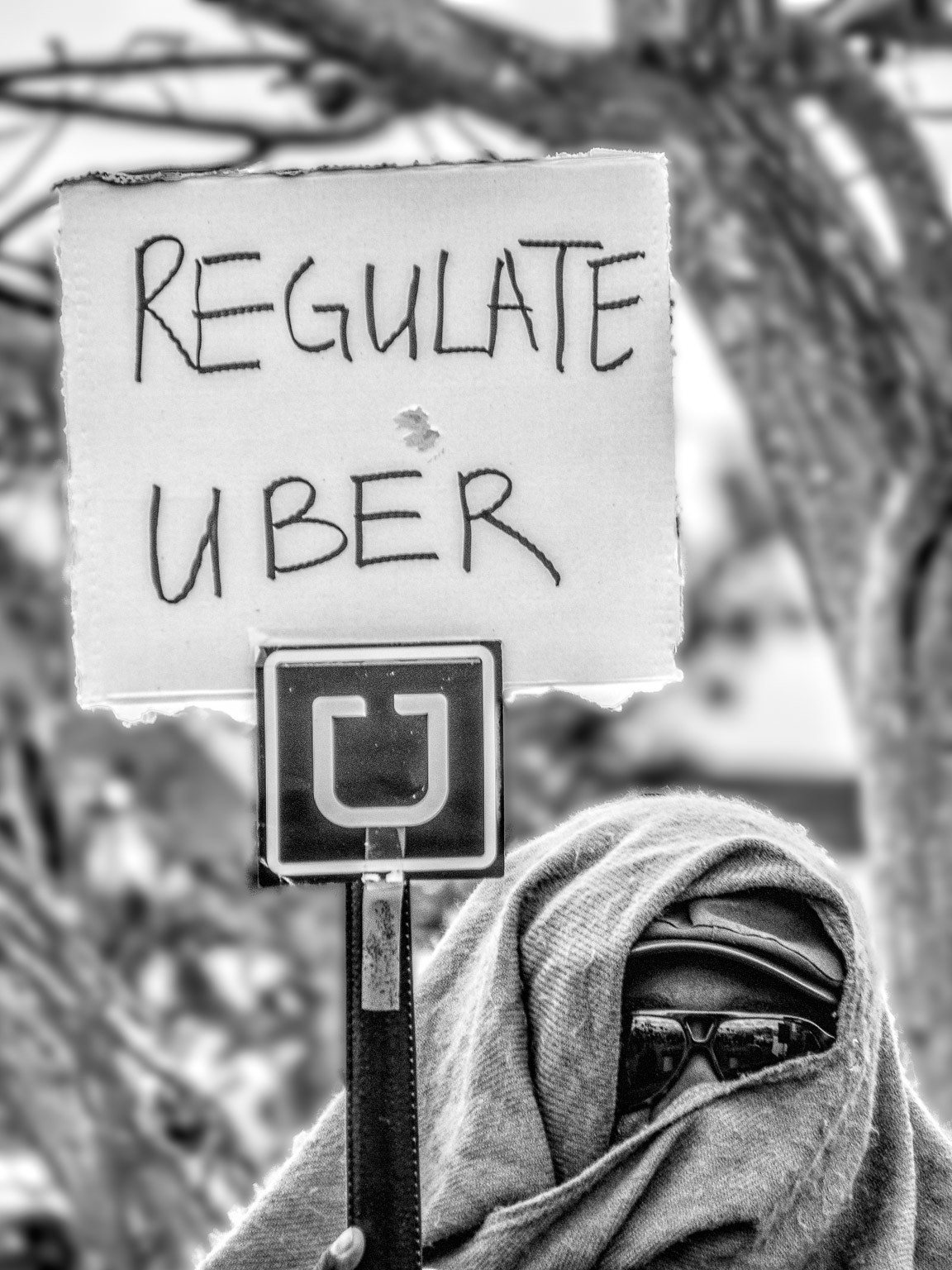
It’s been quite a week for Uber. The company is facing a slew of legal challenges around the world. While each case may appear to be unique to its particular situation, the accumulation of legal slings and arrows represents a much larger issue. Globally, Uber and other gig companies have been aggressively promoting a business model that is quite possibly incompatible with rule of law. If Uber wins in these cases we will need to confront the question: can a 21st century global economy survive and thrive without rule of law? Or do we need to rein in the platform sector, even if it means we need to jettison its dominant business model?
What happened this week: in the United Kingdom, drivers launched a precedent-setting new lawsuit to demand access to their data. The UK Supreme Court also heard arguments in the final stage of a long pending case on driver employment classification. And that’s not all. In Australia, gig companies lost in a class action suit brought by taxi drivers. And all of this follows on a critical decision by Canada’s Supreme Court on June 26 which ruled that drivers cannot be bound by forced arbitration agreements.
What does it all add up to and why is it critical to gig companies’ business model? All these legal battles have three fundamental implications. First, Uber and other gig companies cannot succeed if they have to operate by the same rules as other firms. Second, since their business model cannot succeed within the boundaries of law, the companies must use a defensive strategy that seeks to overturn the law rather than contest the facts. Third, to succeed in escaping legal accountability these companies must fragment disputes – and this is why both the Canada and UK cases represent a pivotal moment that may define our future global economy. Let’s explore each of these points.
Evading Regulation is the Business Strategy
Uber and other transport sector gig companies have spent millions of US dollars in legal fees contesting the proposition that they should be bound by the same rules as other private hire transportation. This argument is at the heart of the Australia class action case. Taxi drivers are alleging that Uber undercut their business by disregarding local regulation and thereby cutting costs. The statement of claim presented stark, irrefutable evidence of Uber’s intention only to enter markets where it would be able to evade regulatory action; indeed the filing cites an internal Uber policy white paper spelling this out as an explicit business strategy. It’s a point that is reinforced by evidence on other gig companies. A recent study of Deliveroo drivers in Germany implied that when drivers organized and simply began sharing information about rates, the company, fearing accountability, pulled out of the market. The author, Niels Van Doorn, uses the phrase “regulatory arbitrage” to describe this essential feature of the gig business model.
Judicial Escape into Cyberspace
This brings us to the second point: gig companies aren’t contesting the facts, they are contesting the right of courts to hold them accountable. Uber’s defense in Australia was not to contest the evidence. It was to claim that the court had no jurisdiction to hear a class action against the company because the company did not exist in Victoria, Australia. This parallels arguments the company has used around the world. In South Africa, Cape Town drivers brought a similar suit in 2016, won in lower court, and lost on appeal, on the grounds that the company did not exist in Cape Town and therefore the court had no jurisdiction over its actions. In essence, this ruling was a license to disregard the law.
The South Africa and UK cases are featured in my interviews with drivers involved in these cases in Episodes 2 and 3 of The Gig Podcast
In the case now before the UK Supreme Court, Uber BV v Aslam et. al., similar arguments were offered. Uber’s response in lower courts to driver claims was initially to state that it did not exist as a commercial entity in the UK, and therefore could not be held liable for any action involving drivers. In all these cases the company has argued that the sole corporate entity is its Netherlands headquarters. The UK courts, however, sensibly found otherwise. Yet, rather than abide by lower court rulings, the company continued to appeal.

The United Kingdom Supreme Court. Photo credit: Cary Bass-Deschenes
In Canada, drivers were not only compelled to use arbitration to settle claims, but contractually obligated to do so in the Netherlands, rendering it virtually impossible to bring claims. Uber’s continued insistence that the company only exists in cyberspace and maintains its sole commercial presence at its Uber BV Netherlands headquarters should give us all pause. In his recent analysis of the Canada and UK cases, Alan Bogg points out that digital companies have attempted to escape the legal stratosphere. As he puts it, “The Heller case is an important reminder that we are now in an era of juridical mobility: employing entities seek to escape national labour law systems without the cost and inconvenience of spatial mobility.”
“We are now in an era of juridical mobility: employing entities seek to escape national labour law systems without the cost and inconvenience of spatial mobility.”
– Alan Bogg
(Professor of Labour Law at the University of Bristol, Co-director of the Bristol Centre for Law at Work)
The “race to the bottom,” or use of geographic mobility to undermine labor and environmental standards by seeking out weak jurisdictions for investment, is nothing new. For decades companies have offshored and outsourced production, seeking labor markets where protections for workers were weakest; yet in traditional supply chains, the chase has been to find those poorly regulated labor markets. In the digital economy, companies can bring regulatory arbitrage to any market. Unfortunately, advocates are still catching up with the old “race to the bottom.” Corporate accountability actors are heavily focused on promoting mandatory human rights due diligence approaches that were built around traditional supply chains, while workers and other stakeholders face a new challenge: the escape into cyberspace to evade any form of legal accountability. Even if advocates are successful at achieving new laws and policies governing supply chains, these will be insufficient for the gig economy.
The answer may be to go beyond due diligence and examine the fundamental legitimacy of these business actors. If a company can effectively claim it cannot be held accountable by courts anywhere (or in very few jurisdictions), is it inherently illegitimate? And if so, what are the implications for our overall economy? Are we willing to tolerate a significant and growing segment of the economy that considers itself beyond legal accountability?
Fragmenting Collective Action
This brings us to the third point, which is about the necessity of fragmenting disputes. The Uber BV v Aslam case in the UK and the Heller case in Canada are about access to collective rights. Uber and other gig companies embody a model that disrupts traditional industries and labor markets by fragmenting work into ever smaller tasks, and isolating and fragmenting workforces. To maintain control over this fragmented workforce, they must resist any shift toward collective agency. This is an important reason why they must compel workers to accept forced arbitration. Arbitration individualizes disputes and curtails access to courts. Class action is impossible.

An Uber driver protesting at a rally in San Diego, California. Photo credit: Wayne S. Grazio
Yaseen Aslam, a plaintiff in the UK case, pointed out in a recent interview that this makes it impossible to bring claims at all, even individually, under laws intended as collective protections, such as anti-discrimination laws. This fragmentation also applies to customers of the platform. There is evidence that the ‘five star’ rating systems that are used to rate drivers reflect gender, racial and ethnic bias; yet the lack of access to data renders it impossible for drivers to prove their ratings are an outcome of discrimination. In this era of global #BlackLivesMatter and #MeToo movements, platform companies are intentionally and systematically undermining anti-discrimination frameworks. Here, too, there are growing legal challenges; mounting sexual assault claims led Uber to agree in 2018 that it would exempt those bringing charges of sexual assault from its forced arbitration clauses.
In this era of global #BlackLivesMatter and #MeToo movements, platform companies are intentionally and systematically undermining anti-discrimination frameworks.
This is why the new lawsuit around data is so critically important. A group of UK Uber drivers have launched a legal action against Uber’s Netherlands headquarters for collective access to their data.* The drivers argue that Uber has violated its obligations under Europe’s General Data Protection Regulation (GDPR) by failing to provide full access to their personal data, and that access to such data would enable them to prove the existence of profiling and discrimination on the platform.
Nor is this the only collective strategy at play. Rebecca Smith of the National Employment Law Project (US) points out that in the US, municipalities are in the forefront of representing the collective interests of gig workers. Cities including San Diego and San Francisco, faced with constituencies experiencing massive unemployment due to the COVID-19 precipitated economic crisis, are jointly suing Uber and Lyft to obtain penalties that would be critical to provide restitution to gig workers as a broad-based class. On July 14, the state of Massachusetts also brought suit. Uber is seeking to fragment even these types of cases claiming that even governments are bound by its forced arbitration clauses and the municipalities therefore cannot bring suit together.
This raises another profound question regarding the future global economy: are we willing to accept new norms for employment that make collective action, and collective protection such as anti-discrimination law, impossible? Or do we need to push for new global norms regarding collective rights? In the face of newfound collective challenges, Uber is claiming it is at the ‘end of the road’ and perhaps that is for the best. If today’s platform companies go out of business, perhaps something better can emerge in their wake. A legal loss in the UK may damage the company’s bottom line not only because of liability for back pay for drivers, but also because it would face a huge tax bill. Similarly in California, if city attorneys win their claims the companies will be liable for hundreds of millions of US dollars in civil penalties. And much more importantly in all these cases, there will be a firm foundation for collective action for gig workers everywhere.

Collectively fighting for rights in the gig economy. Photo credit: Davide Alberani
It’s Time for the Real “Sharing Economy”
The digital economy represents a new layer to globalization, reinforcing the ‘race to the bottom’ by allowing corporations to completely escape the bonds of rule of law. Global legal structures, which had yet to catch up to the problem of accountability in global supply chains, have been caught flat-footed by the new challenges posed by platform sector scofflaws. But it’s not too late to re-center rights in this sector, if we are willing to insist that legitimacy means developing business models that uphold laws and promote collective agency.
The gig economy was initially hailed as a ‘sharing economy’ and the collective agency dilemma is thus a particularly ironic one. Strengthened municipal and state regulations might force the closure of some companies, whose business model is to disrupt regulation and escape accountability. But can other companies emerge in their wake? The Deliveroo Germany case is illustrative here. Drivers, trying to better understand the algorithm that determined their rates, were able to use their own data to reverse-engineer it. In the wake of Deliveroo’s flight, some drivers established a platform cooperative to provide the same service. There is every reason such models can succeed, if governments are willing to adopt and enforce fair regulation for the gig economy.
*There is a Crowdjustice campaign to support the claimants in the GDPR data case
Title image: (Graphic adapted from https://bit.ly/39BK7Jp. Photo credit: Stock Catalog, https://thoughtcatalog.com/)




